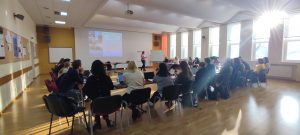At the end of my 5-years work at the Office of the Ombudsperson for Academic Ethics and Procedures of the Republic of Lithuania (Office), I would like to give a snapshot on the changes that have been significant for the Office’s performance and team, as well as for the academic community. First of all, the activities of the Office in the field of complaints handling have been improved in line with the development of case law, and amendments have been made to the Law of the Republic of Lithuania on Research and Higher Education and the Regulations of the Office. Second, a more in-depth look at the status of academic ethics in Lithuania and international good practices was used to delve into the more complex areas of academic ethics in research, providing guidance on what standards of academic ethics each research and higher education institution should implement in building a culture of academic ethics. Third, looking at the most important work of the Office’s team, the Guidelines for Ethical Review have been a milestone in the field of research ethics and research integrity.
The Office has remained open to the academic community through consultancy, newsletters, training and seminars and its annual conferences. The Office has joined international networks, one of which it founded with its European counterparts to share good practices and contribute to national legislation.
Like any organisation, the Office has faced many challenges. Some of these have been overcome through modernisation – through the implementation of various information systems, the use of electronic and other services, and the improvement of working conditions.
I express my gratitude to the academic community and all those who have supported the work of the Office and its team and contributed to the current Office’s standing.
In 2024, a new Ombudsperson of the Office will take up his/her duties. I wish him/her patience and determination in pursuing his/her ideas.
Loreta Tauginienė
Ombudswoman for Academic Ethics and Procedures
2019-2024
